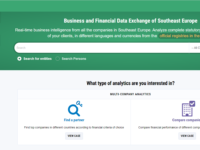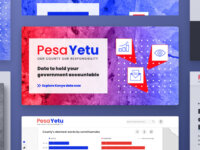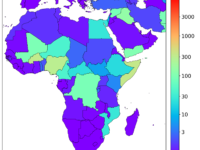Satellites collect images that can be used to identify deformations of infrastructure at millimetre level with InSAR analysis. This project investigates the use of InSAR in the monitoring of deformations of bridges. Can InSAR be of added value for a structural health assessment of bridges which, with aging assets over the largest part of Europe, becomes more and more critical? Nowadays the monitoring of bridges is very labour intensive and often not without danger. InSAR may reduce this.
Innovation Tag: Open Data
In Kenya, it remains difficult for both watchdogs and citizens to understand how financial resources are utilised since it decentralised services from national to county-level governments in 2013.
PesaYetu is a data visualisation website designed to easily explore, interpret and report on budget-driven stories affecting counties. The primary audience is researchers and journalists who want to empower citizens at the county level to engage their leaders on issues concerning policy and governance
Most Brazilian metropolises have a transport network operated by a private company which makes it difficult for transport authorities to have a bright view of the public transport functioning. TRANCITY is a public transport monitoring dashboard which integrates different sources of data, such as bus location, ticketing and cameras, providing real time and historical information that supports management, planning and the operation of public transport networks, with data driven evidence.
The Transparency+ Portal is a digital platform of the Portuguese state, where citizens can access easy-to-read and updated information on public spending in an accessible way, combining data science and storytelling. Launched in 2021, the platform is now a reference resource for monitoring European funds, State and local budgets, and public contracts. In a world often perceived through lens of mis/disinformation, Transparency+ is building trust by nurturing civic engagement and open government.
MedeINN arose from the need to innovate in the government sector, in a city that had been developing its innovation capabilities in all other sectors. For this reason, and under Innovative State premise, we seek to connect the Mayor's Office of Medellín´s challenges with entrepreneurs and researchers capacities. This has been achieved after a redesign of a Public Procurement for Innovation methodology, which enables Open Innovation in the government sector.
The Violence Early-Warning System (ViEWS) is a publicly available data-driven forecasting system at the frontier of research that generates monthly predictions of conflict fatalities up to 36 months ahead – throughout Africa and the Middle East. The project launched in 2017 to help policy-makers and practitioners plan anticipatory action and humanitarian interventions with a transparent and evidence-based approach. It is based at Uppsala University and Peace Research Institute Oslo.
With the Quality Tools an organisation can evaluate, monitor and compare the quality and use of its services within and between organisations. The tools include a Self-assessment, Customer Feedback and Utilisation Rate Measurement tool and are free of charge. The tools were developed primarily for public sector organisations to help them develop customer-oriented digital services and improve knowledge-based management. On a national level the tools provide data on the state of digitalisation.
Case Study
Personalized feedback service for national qualification test result – Digital Mentor Service…

"Why did I fail? How should I develop my career?" To address such concerns, we developed the Digital Mentor Service of National Qualification. It leverages massive data on national qualification tests to identify each individual's weaknesses and why they fail. It also provides personalized information by matching examination history with jobs and training offered by government agencies. Supporting test takers from skills assessment and development to job placement.
Case Study
BIFIDEX – Official Business and Financial Analytics for the single market in the Western…

Countries in the Western Balkans created digital infrastructure to support transparent business operation and prevent fraud in their Common Regional Market. The official registries from 5 countries in the Western Balkans created a digital platform, connecting all official legal and financial data about companies, connected entities, blocked bank accounts and sanctioned persons, bridging different legislations, languages and currencies. The platform won the 2022 OECD/SIGMA/ReSPA award.
Governments around the world are censoring the Internet, but how can we document, track, and respond to Internet censorship events? In 2022, the Open Observatory of Network Interference (OONI) launched the Measurement Aggregation Toolkit (MAT) which hosts one of the largest open datasets on Internet censorship to date. In real-time, new measurements are published from around the world, enabling researchers, journalists, and human rights defenders to track and respond to censorship worldwide.



